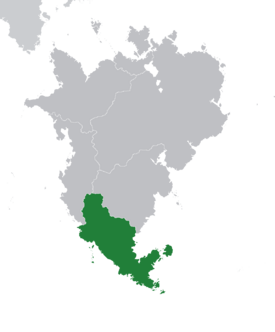User:Char/sandbox5: Difference between revisions
Jump to navigation
Jump to search
mNo edit summary |
mNo edit summary |
||
| Line 3: | Line 3: | ||
| conventional_long_name = United Republics of Anratahuaca | | conventional_long_name = United Republics of Anratahuaca | ||
| common_name = Anratahuaca | | common_name = Anratahuaca | ||
| native_name = | | native_name = Cepan Tlacatlatocayotl Anratahuaca | ||
| image_flag = | | image_flag = | ||
| image_coat = Aztec_solar_disc.svg | | image_coat = Aztec_solar_disc.svg | ||
| Line 15: | Line 15: | ||
| coordinates = | | coordinates = | ||
| largest_city = [[Tecolotlan]] | | largest_city = [[Tecolotlan]] | ||
| official_languages = {{wp|Nahuatl}} | | official_languages = {{wp|Nahuatl}} | ||
| ethnic_groups = {{unbulleted list | | ethnic_groups = {{unbulleted list | ||
| {{nowrap|% {{wp|Nahua}}}}<br>{{nowrap|% {{wp|Purépecha}}}}<br>{{nowrap|% {{wp|Otomi}}}}<br>{{nowrap|5% {{wp|Zacateco}}}}<br>{{nowrap|% {{wp|Pame people|Xi'oi}}}}<br>{{nowrap|% {{wp|Tecuexe}}}}<br>{{nowrap|% {{wp|Tswana people|Tzhuana}}}}<br>{{nowrap|3% {{wp|Caxcan}}}}<br>{{nowrap|% {{wp|Yahgan people|Iakan}}}}<br>{{nowrap|% {{wp|Mapuche}}}}<br>{{nowrap|% {{wp|Pericúes|Pericú}}}}<br>{{nowrap|2% {{wp|Guaycura people|Guaycura}}}}<br>{{nowrap|% {{wp|Cochimí}}}}<br>{{nowrap|% {{wp|Selk'nam people|Ona}}}}<br> % Immigrants | | {{nowrap|% {{wp|Nahua}}}}<br>{{nowrap|% {{wp|Purépecha}}}}<br>{{nowrap|% {{wp|Otomi}}}}<br>{{nowrap|5% {{wp|Zacateco}}}}<br>{{nowrap|% {{wp|Pame people|Xi'oi}}}}<br>{{nowrap|% {{wp|Tecuexe}}}}<br>{{nowrap|% {{wp|Tswana people|Tzhuana}}}}<br>{{nowrap|3% {{wp|Caxcan}}}}<br>{{nowrap|% {{wp|Yahgan people|Iakan}}}}<br>{{nowrap|% {{wp|Mapuche}}}}<br>{{nowrap|% {{wp|Pericúes|Pericú}}}}<br>{{nowrap|2% {{wp|Guaycura people|Guaycura}}}}<br>{{nowrap|% {{wp|Cochimí}}}}<br>{{nowrap|% {{wp|Selk'nam people|Ona}}}}<br> % Immigrants | ||
| Line 83: | Line 82: | ||
| calling_code = | | calling_code = | ||
| cctld = | | cctld = | ||
|religion = }} | |religion = | ||
}} | |||
==Etymology== | |||
The name ''Anratahuaca'' derives from the Purépecha word Angajtakuaka which means "Land of the Heron" transliterated rather than translated into Nahuatl. The Nahuatl translation ''Aztacan'' which has the same meaning has been used during certain periods as interchangeably, but is less common. The territory at the far south of the Oxidentalese continent bore many names, including ''Tsakapuka'' meaning the "Land of Stones" and ''Huitztlan'' meaning "Southern Land". The region only take the name Anratahuaca following the rise of the eponymous Anratahuaca state which was sometimes called the Heron Empire as the heron was the symbol for divinity, royalty and the state. | |||
Revision as of 19:19, 1 March 2022
United Republics of Anratahuaca Cepan Tlacatlatocayotl Anratahuaca | |
|---|---|
 | |
| Capital | Tequitinitlan |
| Largest city | Tecolotlan |
| Official languages | Nahuatl |
| Ethnic groups | |
| Demonym(s) | Anratahuacan |
| Legislature | Necentlatiloyan |
| Area | |
• Total | 1,845,600 km2 (712,600 sq mi) |
| HDI (2019) | very high |
| Currency | Amatl |
| Driving side | right |
Etymology
The name Anratahuaca derives from the Purépecha word Angajtakuaka which means "Land of the Heron" transliterated rather than translated into Nahuatl. The Nahuatl translation Aztacan which has the same meaning has been used during certain periods as interchangeably, but is less common. The territory at the far south of the Oxidentalese continent bore many names, including Tsakapuka meaning the "Land of Stones" and Huitztlan meaning "Southern Land". The region only take the name Anratahuaca following the rise of the eponymous Anratahuaca state which was sometimes called the Heron Empire as the heron was the symbol for divinity, royalty and the state.